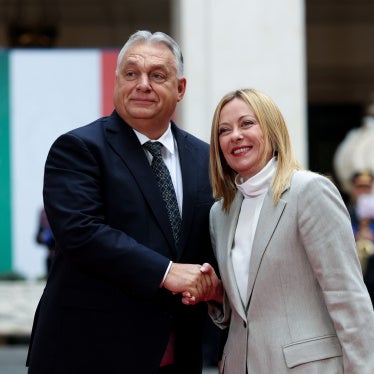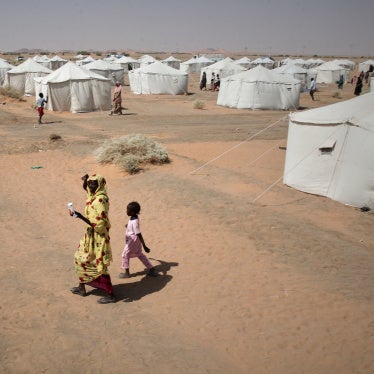Bringing to justice those who commit atrocities has obvious appeal. It provides redress for victims and their families, punishes perpetrators, and deters others from replicating their crimes. But is the price too high? Critics argue that the threat of prosecution compels dictators to cling to power rather than step down, or that it encourages abusive combatants to fight on rather than sue for peace. Yet a decade of experience with international tribunals suggests these fears are overblown.
The example of Charles Taylor, Liberia's brutal former president who on Thursday begins his third year in comfortable exile in Nigeria, shows that the costs of ignoring justice can be high. Taylor is one of only two sitting heads of state to have been charged by an international tribunal.
In June 2003, a United Nations-backed court unsealed an indictment of Taylor for his role in supporting Revolutionary United Front rebels known for murder, rape and hacking off the limbs of many of its victims during Sierra Leone's civil war.
Two months later, as rebels were poised to take Monrovia, the Liberian capital, Taylor's days as president were clearly numbered. Yet rather than arrest and deliver him for trial, Nigeria, with the tacit consent of the United States and Britain, gave him sanctuary.
This sweetheart deal has so far deprived Taylor's many victims and Sierra Leone's people of the opportunity to see one of their prime persecutors brought to justice. It also risks emboldening other would-be tyrants to carry out similar atrocities, since they might calculate that, if their crimes catch up with them, they, too, can opt for exile over imprisonment.
It need not have been that way. The case of former President Slobodan Milosevic of Yugoslavia, who in May 1999 became the first sitting head of state to be indicted by an international tribunal, illustrates an alternative approach. When Serbs took to the streets en masse in October 2000 to challenge his rule - defiance fueled in part by international reaction to his indictment - the threat of prosecution did not delay his ouster. Lacking power to shield himself from prosecution, he was soon shipped to The Hague, where he is now standing trial.
That a risk of prosecution does not impede the toppling of dictators is suggested as well by many of Milosevic's predecessors. Before the era of international tribunals, tyrants whose regimes were crumbling typically fled abroad. Among them were Marcos of the Philippines, Duvalier of Haiti, Mengistu of Ethiopia, Amin of Uganda, Stroessner of Paraguay, Mobutu of Zaire, and the Shah of Iran. But as their reigns came to an end, all shared Milosevic's powerlessness to insist on formal protection from prosecution, despite the possibility of being forced back home to stand trial. As is typical, all clung to power until the last possible moment, by which point they had no capacity to prolong their rule in quest of official amnesty.
Even when the aim is ending armed conflict, when warring parties may be more willing to compromise before the bitter end, the advantages of not prosecuting are often exaggerated. The issue is not amnesty for merely taking up arms - a reasonable part of many peace agreements - but amnesty for atrocities committed during the conflict.
Once more, the situation in the former Yugoslavia is instructive. Milosevic accepted the Dayton Peace Accord ending the Bosnian conflict without obtaining an amnesty, even though an international criminal tribunal for the region had been established, and he was an obvious target.
Moreover, the threat of prosecution helped Bosnia by forcing some of its most vicious leaders to lie low, removing them from the political scene.
A deterrent effect can also be found today in Darfur and eastern Congo, where the involvement of the International Criminal Court has contributed to a reduction in violence by forcing murderous commanders to adopt the mantle of reform to avoid the prosecutor's attention.
By contrast, the cost of impunity from prosecution can be high. During the Sierra Leone civil war, an attempt to placate the Revolutionary United Front by giving it amnesty in July 1999 allowed the rebels to regroup and resume their atrocities. Similarly, the impunity so far allowed Indonesia's military for its September 1999 slaughter in East Timor has emboldened the military to continue its brutality in Aceh; some abusive military leaders were even transferred from one conflict to the other.
Allowing murderous forces not only to escape justice but also to remain intact is a particularly dangerous recipe for renewed atrocities.
President Álvaro Uribe of Colombia seems poised to repeat that mistake today by giving his country's deadly paramilitaries a slap on the wrist without insisting on genuine demobilization.
Even when circumstances delay prosecution, they should never evolve into formal amnesty. The possibility of prosecution when abusive forces no longer pose a threat should always be left open. The experience of Sierra Leone, where the United Nations' refusal to endorse a national amnesty for the RUF did not keep it from signing a peace accord, suggests that the threat of international prosecution need not undermine a peace process.
Shielding an abusive leader from justice is particularly inappropriate once he no longer commands troops. Whatever the reasons for granting Taylor temporary refuge in Nigeria, it is wrong for President Olusegun Obasanjo of Nigeria, two years later, still to refuse to surrender him for trial.
No one claims that justice is easy or painless. Competing priorities must sometimes be weighed. But experience suggests that the benefits of prosecuting those responsible for atrocities can be secured without the prolonged wars and extended dictatorships that critics often claim.
Kenneth Roth is executive director of Human Rights Watch.








